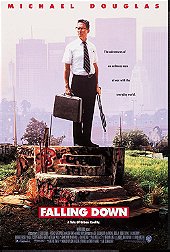Due to the blatant inconsistency of the quality of his motion pictures, director Joel Schumacher has an undoubtedly interesting résumé. For every Tigerland, there's a Batman & Robin or a Number 23. When Schumacher is working with a solid screenplay, he can weave an engaging tale, guide actors to brilliance, and challenge audiences with complicated themes and multifaceted narratives. 1993's Falling Down is an effective demonstration of these skills. A nuanced masterwork, Falling Down is bursting with relevant questions, in addition to offering an intriguing exploration of the human condition and a look at the decay of modern society. The film is so provocative, in fact, that the script was rejected by countless studios before Michael Douglas gave it his seal of approval and began to get involved.

Falling Down is the tragic tale of William "D-Fens" Foster (Douglas) who becomes fed up with what society is force-feeding him, and simply snaps. The ultra-patriotic man is recently divorced, out of work, and stuck living with his mother whom he resents. Added to this, his former wife has taken a restraining order against him. Stuck in a traffic jam on his daughter's birthday with flies buzzing around him, Foster decides to abandon his car and go see his daughter...and woe unto anyone who gets in his way. Following a few violent encounters, he begins to wander around the city with a bad attitude, a bag full of guns, and a desire to put society to the test. Meanwhile, a soon-to-be-retired detective named Martin Prendergast (Duvall) instigates an investigation into the ostensibly random swath of devastation left in Foster's wake. Hoping to stop the maniac before anyone gets seriously hurt, Prendergast and his partner work to identify Foster's destination and troubled past.
To the untrained eye, Falling Down appears to be just another escapist vigilante affair. Yet, while there are a number of memorable action-oriented confrontations, the primary focus of the movie is examining the dying soul of William Foster. The character represents a manifestation of our own daily frustrations at life, but is also a potent reminder as to why we should learn to deal with these stresses without losing our sanity. After all, who has not dreamed of mass destruction while stuck in a traffic jam? Who has not been frustrated by road works when nothing is truly wrong with the road? Who has not been bothered by high prices at a local store? Who has not wondered why fast food never looks as appealing on the tray as it does in advertisements? If we lost control during any of these scenarios, would we really exhibit unwavering moral fortitude? Screenwriter Ebbe Roe Smith suggests that the answer is no - most of us would resort to aggression, assault or violence to apply our own brand of justice to a given situation. Thus, Falling Down is far more challenging and thoughtful than most other vigilante pictures.

As previously discussed, Joel Schumacher's filmography is very mixed. While watching Falling Down, it's difficult to believe that this is the work of the same man whose name is attached to the worst Batman film in history. Falling Down is definitely Schumacher's most intellectually advanced feature, and there's fine craftsmanship to exhibit from start to finish. For instance, the beginning sequence is a clear tribute to Fellini, with Foster's pain and frustration being conveyed through images instead of mere words. We can feel the heat, the tension, and the building rage. When Foster gets out of his car, it's a relief for both the audience and the character. There's only one big flaw with Falling Down: the depiction of the police. The captain is stupid, a lot of the cops are dumb and egocentric, and Duvall's character adheres to the "final day before retirement" cliché. There are other clichés, such as Foster and his ex-wife being on bad terms, but, fortunately, the narrative clicks wonderfully for the most part.
Playing the unstable William Foster, an electrifying Michael Douglas injects a startling intensity into every line, expression and command. This is also a change of scenery for the star - Foster is an unremarkable, plain-looking man that is the opposite of Gordon Gekko or any other character that Douglas has portrayed before. He is the type of bloke you would expect to find in any office building, and this is what makes the film so chilling. Meanwhile, Robert Duvall's masterfully understated performance should not be overlooked. Duvall truly inhabited the role, and serves as a welcome counterbalance for every mad move that Foster makes. He also contrasts Foster in every way: he moves slowly and deliberately, his words meander out of his unclenched mouth, and his demeanour is unflinchingly calm. In the film's supporting cast, Barbara Hershey is excellent as Foster's former wife, while Rachel Ticotin (Total Recall) is solid as Duvall's partner, and Frederic Forrest (Apocalypse Now) is terrifying as the homophobic neo-Nazi shop owner whom Foster has a run-in with.

More than a depiction of rage, helplessness and mental instability, Falling Down is a mesmerising reminder of the fragility of the human mind as well as an engrossing dissection of tolerance, empowerment and inadequacy. Indeed, the issues confronted by this extremely underrated movie confidently elevate it above the run-of-the-mill action film. While a viewer wanting gun-play will probably not walk away disappointed, there is more on offer here than pure escapism.
8.5/10
 Login
Login